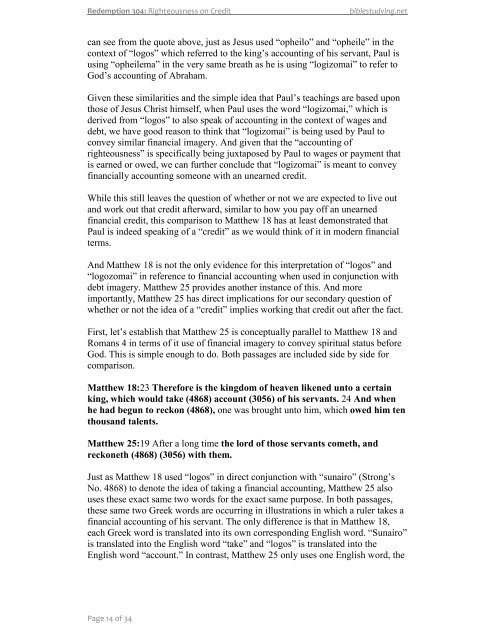righteousness-credit
righteousness-credit
righteousness-credit
You also want an ePaper? Increase the reach of your titles
YUMPU automatically turns print PDFs into web optimized ePapers that Google loves.
Redemption 304: Righteousness on Credit<br />
biblestudying.net<br />
can see from the quote above, just as Jesus used “opheilo” and “opheile” in the<br />
context of “logos” which referred to the king’s accounting of his servant, Paul is<br />
using “opheilema” in the very same breath as he is using “logizomai” to refer to<br />
God’s accounting of Abraham.<br />
Given these similarities and the simple idea that Paul’s teachings are based upon<br />
those of Jesus Christ himself, when Paul uses the word “logizomai,” which is<br />
derived from “logos” to also speak of accounting in the context of wages and<br />
debt, we have good reason to think that “logizomai” is being used by Paul to<br />
convey similar financial imagery. And given that the “accounting of<br />
<strong>righteousness</strong>” is specifically being juxtaposed by Paul to wages or payment that<br />
is earned or owed, we can further conclude that “logizomai” is meant to convey<br />
financially accounting someone with an unearned <strong>credit</strong>.<br />
While this still leaves the question of whether or not we are expected to live out<br />
and work out that <strong>credit</strong> afterward, similar to how you pay off an unearned<br />
financial <strong>credit</strong>, this comparison to Matthew 18 has at least demonstrated that<br />
Paul is indeed speaking of a “<strong>credit</strong>” as we would think of it in modern financial<br />
terms.<br />
And Matthew 18 is not the only evidence for this interpretation of “logos” and<br />
“logozomai” in reference to financial accounting when used in conjunction with<br />
debt imagery. Matthew 25 provides another instance of this. And more<br />
importantly, Matthew 25 has direct implications for our secondary question of<br />
whether or not the idea of a “<strong>credit</strong>” implies working that <strong>credit</strong> out after the fact.<br />
First, let’s establish that Matthew 25 is conceptually parallel to Matthew 18 and<br />
Romans 4 in terms of it use of financial imagery to convey spiritual status before<br />
God. This is simple enough to do. Both passages are included side by side for<br />
comparison.<br />
Matthew 18:23 Therefore is the kingdom of heaven likened unto a certain<br />
king, which would take (4868) account (3056) of his servants. 24 And when<br />
he had begun to reckon (4868), one was brought unto him, which owed him ten<br />
thousand talents.<br />
Matthew 25:19 After a long time the lord of those servants cometh, and<br />
reckoneth (4868) (3056) with them.<br />
Just as Matthew 18 used “logos” in direct conjunction with “sunairo” (Strong’s<br />
No. 4868) to denote the idea of taking a financial accounting, Matthew 25 also<br />
uses these exact same two words for the exact same purpose. In both passages,<br />
these same two Greek words are occurring in illustrations in which a ruler takes a<br />
financial accounting of his servant. The only difference is that in Matthew 18,<br />
each Greek word is translated into its own corresponding English word. “Sunairo”<br />
is translated into the English word “take” and “logos” is translated into the<br />
English word “account.” In contrast, Matthew 25 only uses one English word, the<br />
Page 14 of 34


